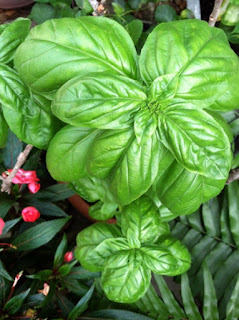- The botanical name for basil is Ocimum basilicum, and it belongs to the mint family. It is sometimes called Saint-Joseph's-wort.
- The name basil comes from the Latin, basilius, meaning "royal" or "kingly" possibly because the plant was believed to have been used in royal perfumes.
- The plant is native to Africa but has spread throughout the world.
- Ancient herbalists believed that putting basil leaves on bites or stings would draw out the poison. According to legend, it was a remedy for basilisk's venom, as well.
- Modern researchers have found that it has anti-fungal and insect-repelling properties, and that it may actually be toxic to Mosquitoes. It's also said to have anti-aging and antibacterial properties, and to reduce inflammation.
- There are numerous varieties of basil, which vary in terms of their taste and aroma. The variety most commonly used in cooking is sweet basil (or Genovese basil). Other varieties include Thai basil, lemon basil and holy basil. Some varieties have a more lemony taste and there's one which tastes like Liquorice. This is because the different essential oils vary in concentration between the different varieties.
- Basil is a good source of vitamin K, manganese and vitamin A.
- It has religious significance for many. In the Greek Orthodox Church, basil is used to sprinkle holy water. Basil is considered sacred in the Hindu cultures, believed to be a favourite of their gods. Jewish folklore suggests it adds strength while fasting.
- Some European cultures believe that placing a spring of basil in the hands of a dead person will grant them a safe journey to the afterlife. In India, there is a similar belief, except there, they place the sprig in the person's mouth. This belief has been around since ancient Egypt and Greece, when it was believed basil would open the gates of heaven to allow a person to pass through.
- There are superstitions connecting the plant with love, too. In some cultures basil is a sign of love and devotion between couples. In Portugal, dwarf bush basil is traditionally presented, along with a poem and a paper carnation, to a sweetheart on the feast days of St John and St Anthony.
Thursday, 1 August 2019
1 August: Basil
For a brief time, France re-invented its calendar. As well as re-naming months, it dedicated each day to something, an animal, substance, or plant. 1 August was dedicated to the herb Basil. Here are 10 facts about it.
Labels:
Food and drink
Subscribe to:
Post Comments (Atom)

No comments:
Post a Comment